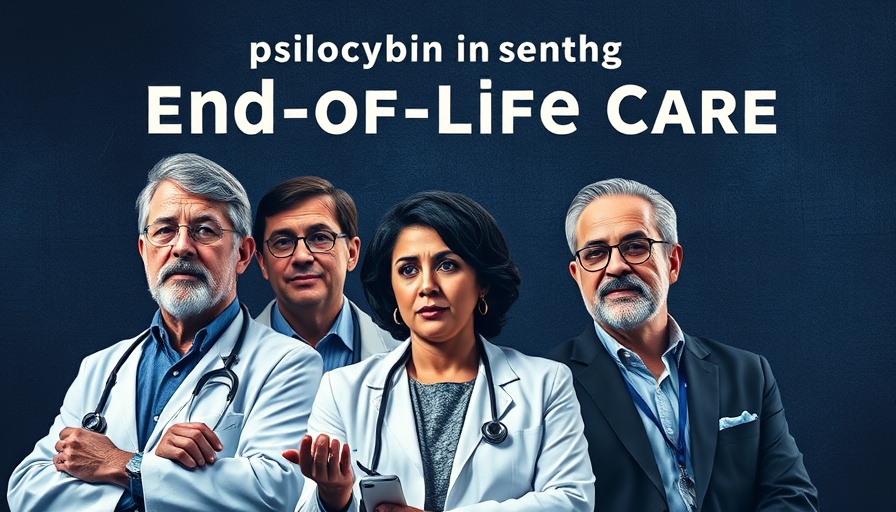
Understanding Psilocybin and Its Therapeutic Potential
In recent years, psilocybin, the active compound found in certain mushrooms, has gained attention for its potential in treating various mental health disorders, particularly in end-of-life care. This natural compound has shown promise in alleviating anxiety, depression, and existential distress in terminally ill patients. With research backing its efficacy, the conversation around psilocybin is evolving, opening new avenues for mental health support during one of life’s most challenging times.
In 'Exploring Psilocybin’s Role in End-of-Life Care,' we analyze how this natural compound impacts patient well-being, prompting a deeper dive into its therapeutic applications.
The Role of Psilocybin in End-of-Life Care
The video "Exploring Psilocybin’s Role in End-of-Life Care" featuring BJ Miller, M.D. and Bridget Sumer, L.C.S.W., delves into how psilocybin can enhance quality of life for those faced with terminal illnesses. Doctors advocate for integrating this compound into a holistic approach to wellness at the end of life. Patients report improved mood and decreased anxiety levels, enabling them to approach their remaining time more peacefully and compassionately.
Holistic Wellness: Expanding Perspectives in Care
The incorporation of psilocybin into end-of-life care is just one example of how holistic wellness practices are gaining traction in medical conversations. Traditional health and wellness approaches often focus solely on physical symptoms; however, understanding that mental health significantly impacts overall well-being is crucial. This broader perspective encourages the acceptance of alternative treatments, including natural supplements, herbal remedies, and mindfulness practices that complement conventional medicine.
Timely Insights: Psilocybin and Current Health Trends
As the healthcare landscape shifts toward more patient-centric models, the search for innovative treatments that promote well-being is ever more critical. Recent discussions around natural health tips and wellness strategies highlight the need for alternative therapies like psilocybin. With increasing interest from both practitioners and patients, there is a significant potential for psilocybin to emerge as a viable option in the wellness toolbox for seniors seeking holistic health solutions.
What the Future Holds: Predictions for Psilocybin in Medicine
Looking ahead, the integration of psilocybin into end-of-life care may serve as a catalyst for broader acceptance of psychedelic compounds in mainstream medicine. Future predictions suggest that with ongoing research and positive patient outcomes, psilocybin could shift the paradigm of how mental health support is delivered, particularly for vulnerable populations. Investments in clinical trials and education could bolster this movement, enhancing awareness and offering hope for individuals grappling with difficult conversations about mortality.
Emotional Perspectives: Human Stories Behind the Science
Ultimately, the discussion around psilocybin in end-of-life care is not just about the science; it’s about the human experience. Stories from patients convey the emotional relief and clarity that these sessions can provide. They emphasize that beyond medications and traditional therapies, the need for mental clarity and emotional peace resonates deeply within those approaching life's end. This addresses a fundamental human desire for dignity, connection, and a sense of closure, promoting a better final chapter.
Actionable Insights: Exploring Your Options
For those contemplating psilocybin therapy, it’s essential to engage with healthcare professionals knowledgeable in holistic health practices. By understanding the benefits and risks involved, patients and their families can make informed decisions about including psilocybin in their end-of-life care plans. Additionally, incorporating self-care practices, such as mindfulness meditation and stress relief strategies, can enhance overall well-being during challenging times.
Research indicates that life quality does not cease at the end; rather, patients can experience fulfillment and peace through supportive measures during this phase. Exploring the wave of interest concerning psilocybin’s therapeutic potential is valuable not just for health and wellness advocates, but for anyone invested in the conversation surrounding healthy aging.
In conclusion, as we navigate the complexities of health care, it’s crucial to remain open to new ideas and approaches. Engaging with psyilocybin could redefine end-of-life experiences for many, merging science with the deeply human aspects of care.
 Add Element
Add Element  Add Row
Add Row 




Write A Comment